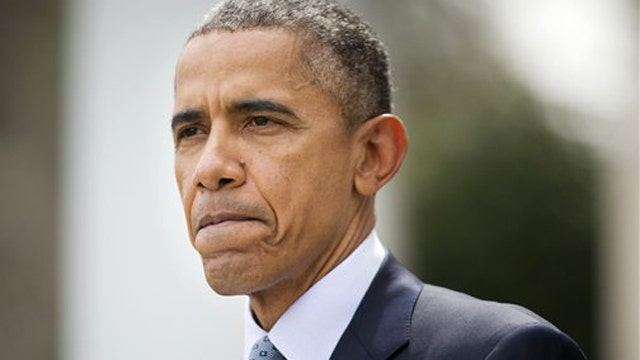Obama calls Iran nuke deal 'once in a lifetime opportunity'
Ed Henry reports from the White House
The Obama administration mounted a new argument Monday for why skeptical lawmakers and U.S. allies should back the preliminary nuclear agreement with Iran, calling it a “forever agreement” that would block all pathways to a nuclear weapon and set up tough international inspections with no end date.
Energy Secretary Ernest Moniz, in a rare appearance at the White House press briefing, used that term in defending the deal he helped strike in Switzerland.
“I want to say this is not an agreement for 10 years or 15 years or 20 years. It is a long-term agreement with a whole set of phases,” he said. “And if Iran earns over this time period trust and confidence in their peaceful objectives, well then over time the constraints will, in phases, ease up, but never get lower than the additional protocol and all of the access that it provides.
“So that's the way we’re thinking about it. It's not a fixed-year agreement. It's a forever agreement in a certain sense, with different stages.”
Yet, as Moniz acknowledged, the fact-sheet circulated by the White House last week includes a series of expiration dates for key components of the deal.
This includes:
- A commitment by Iran to reduce its centrifuges by two-thirds and enrich uranium with only 5,060 of them for 10 years.
- A commitment by Iran not to enrich uranium at the Fordo facility for at least 15 years.
- A commitment by Iran not to build any new facilities to enrich uranium for 15 years.
Asked Monday how this could be considered “forever,” White House Press Secretary Josh Earnest said they were referring to how Iran would have to submit to a new set of intrusive nuclear inspections, as part of provisions that have “no end date.”
Moniz likewise pointed to these comprehensive inspections – part of what he called “unprecedented” access and transparency -- in calling this a “forever agreement.” (Some of those inspection requirements still have end-dates on them, though much further out than 10 or 15 years.)
Moniz, a nuclear physicist, spoke at the White House as the Obama administration ramped up its campaign for a framework deal with Iran that has drawn criticism from congressional Republicans, the Israeli government and skeptical Arab allies of the U.S.
Under the agreement, Moniz said, all plutonium created as a byproduct of Iran's nuclear power production would be sent out of the country so it couldn't be used to make weapons. And international inspectors would watch over all stages to ensure Tehran sticks to the agreement. "This is not built upon trust, this is built upon hard-nosed requirements," Moniz said.
Israeli Prime Minister Benjamin Netanyahu has been among the most vocal critics in airing concerns about how certain terms of the deal last for just 10 years.
For the near term, though, the Obama administration is perhaps most concerned about selling this deal to Congress, where lawmakers are set to soon consider bipartisan legislation giving Congress a say on any Iran deal.
Senate Majority Leader Mitch McConnell, R-Ky., on Monday reiterated some of his concerns with the deal, citing the timeline spelled out in the framework unveiled last week.
“The parameters of the interim deal, in essence, establish an internationally recognized, 10-year nuclear research and development program. Until we know more about Iran's previous research, no nation can be sure of what Iran may have developed covertly already,” he said in a statement. McConnell vowed that the Senate would “respond legislatively” with the congressional review bill, which is set for a committee vote next week.
House Speaker John Boehner, meanwhile, linked from his Twitter page to a first-hand account of his call last week with Obama on the agreement.
“It would be naïve to suggest the Iranian regime will not continue to use its nuclear program, and any economic relief, to further destabilize the region,” Boehner said. “In the weeks ahead, Republicans and Democrats in Congress will continue to press this administration on the details of these parameters and the tough questions that remain unanswered. We will stand strong on behalf of the American people and everyone in the Middle East who values freedom, security, and peace.”
Obama continues to staunchly defend the framework agreement worked out with other world powers as a "once-in-a-lifetime opportunity" to prevent an Iranian bomb and bring longer-term stability to the Middle East. He insists the U.S. would stand by Israel if it were to come under attack, but acknowledged that his pursuit of diplomacy with Tehran has caused strain with the close ally.
"It's been a hard period," Obama said in an interview with New York Times columnist Thomas Friedman. He added that it is "personally difficult" for him to hear his administration accused of not looking out for Israel's interests.
The framework reached with Iran last week clears the way for negotiators to hammer out technical details ahead of a June 30 deadline for a final deal.
He reiterated his opposition to the legislation that would give the U.S. Congress final say in approving or rejecting a deal, but said he hoped to find a path to allow Congress to "express itself."
Earnest on Monday urged Congress to at least wait until June to pass judgment on the plan, while still opposing any up-or-down vote in Congress.
The Associated Press contributed to this report.













































